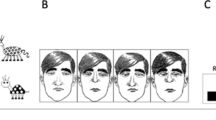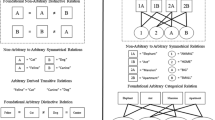Abstract
Assessed the effects of a categorization strategy on the acquisition, maintenance, and generalization of the abilities of four children with autism to accurately complete uni-, bi-, and tridimensional sorting tasks. The independent variable was a categorization strategy involving uni-, bi-, and tridimensional categorization. The dependent variable was the number of items correctly sorted. The research involved a multiple baseline across-behaviors design with clinical replications. Data indicate that categorization strategy training resulted in increased performance on uni-, bi-, and tridimensional sorting tasks by four children with autism. Three children showed stability with 100% accuracy on uni-, bi-, and tridimensional sorting activities; improvements on generalization probes associated with strategy training; and performance maintenance 2 months after the study. The results of the current research substantiate the worth of categorization strategy training for three children with autism.
Similar content being viewed by others
References
American Psychiatric Association. (1987).Diagnostic and statistical manual of mental disorders (3rd ed., rev.). Washington, DC: Author.
Borkowski, J. G., & Cavanaugh, J. D. (1979). Maintenance and generalization of skills and strategies by the retarded. In N. R. Ellis (Ed.).Handbook on mental deficiency, psychological theory and research (2nd ed., pp. 569–617). Hillsdale, NJ: Erlbaum.
Brown, A. L., Bransford, J. D., Ferrara, R. A., & Campione, J. C. (1983). Learning, remembering, and understanding. In J. H. Flavell & E. M. Markman (Vol. Eds.),Cognitive development (Vol. 3, pp. 77–166) of P. H. Mussen (Ed.),Handbook of child psychology (4th ed.). New York: Wiley.
Brown, A. L., Campione, J. C., Bray, N. W., & Wilcox, B. L. (1973). Keeping track of changing variables: Effects of rehearsal training and rehearsal prevention in normal and retarded adolescents.Journal of Experimental Psychology, 101, 123–131.
Campione, J. C., & Brown, A. L. (1977). Memory and metamemory development in educable retarded children. In R. V. Kail, Jr., & J. W. Hagen (Eds.),Perspectives on the development of memory and cognition (pp. 234–256). Hillsdale, NJ: Erlbaum.
Jones, B. F., & Hall, J. W. (1982). School applications of the mnemonic keyword method as a study strategy by eighth graders.Journal of Education Psychology, 74, 230–237.
Kazdin, A. E. (1982).Single-case research designs: Methods for clinical and applied settings. New York: Oxford University Press.
Kellas, G., Ashcroft, M. H., & Johnson, N. S. (1973). Rehearsal processes in the short-term memory performance of mildly retarded adolescents.American Journal of Mental Deficiency, 77, 670–679.
Leon, J. A., & Pepe, H. J. (1983). Self-instructional training: Cognitive behavior modification for remediating arithmetic deficits.Exceptional Children, 50, 54–60.
Pressley, M., & Brainerd, C. J. (Eds.). (1985).Cognitive learning and memory in children. New York: Springer-Verlag.
Prior, M. R. (1979). Cognitive abilities and disabilities in infantile autism: A review.Journal of Abnormal Child Psychology, 7, 357–380.
Prior, M. R. (1985). Developing concepts in childhood autism: The influence of experimental cognitive research. In S. Chess & A. Thomas (Eds.),Annual progress in child psychiatry and child development (pp. 430–451). New York: Brunner/Mazel.
Rutherford, R. B., & Nelson, C. M. (1988). Generalization and maintenance of treatment effects. In J. C. Witt, S. N. Elliott, & F. M. Gresham (Eds.),Handbook of behavior therapy in education (pp. 277–324). New York: Plenum Press.
Rutter, M. (1983). Cognitive deficits in the pathogenesis of autism.Journal of Child Psychology and Psychiatry, 24, 513–532.
Rutter, M., & Schopler, E. (1987). Autism and pervasive developmental disorders: Concepts and diagnostic issues.Journal of Autism and Developmental Disorders, 17, 159–186.
Simpson, R. L., & Regan, M. (Eds.). (1986).Management of autistic behavior: Information service for educators. Rockville, MD: Aspen.
Author information
Authors and Affiliations
Rights and permissions
About this article
Cite this article
Bock, M.A. Acquisition, maintenance, and generalization of a categorization strategy by children with Autism. J Autism Dev Disord 24, 39–51 (1994). https://doi.org/10.1007/BF02172211
Issue Date:
DOI: https://doi.org/10.1007/BF02172211




